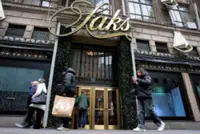THIS year might go down in history as the end of free and fast shipping.
The good old days were sweet.
Already a subscriber? Log in
The Star Festive Promo: Get 35% OFF Digital Access
Cancel anytime. Ad-free. Unlimited access with perks.
Follow us on our official WhatsApp channel for breaking news alerts and key updates!
Thank you for your report!





